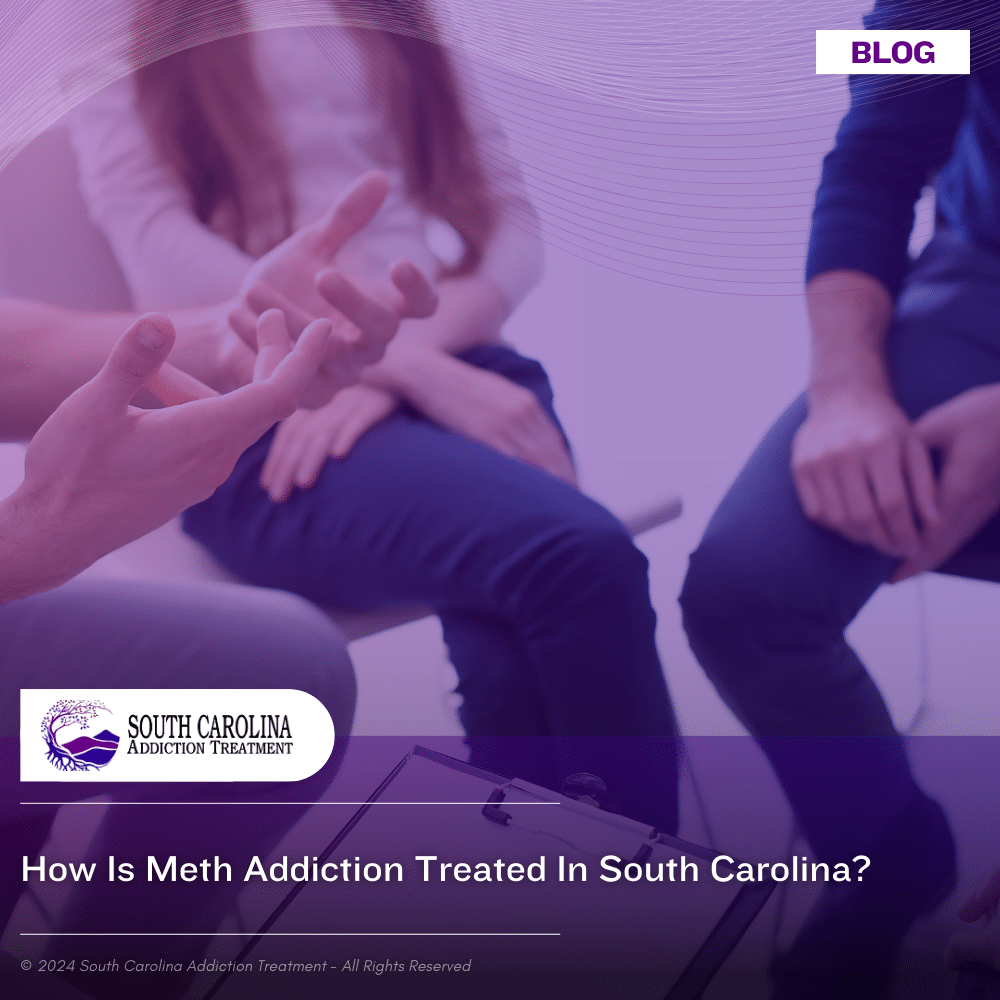How is Meth Addiction Treated in South Carolina?

Medically Verified: 2/1/24
Medical Reviewer
Chief Editor

All of the information on this page has been reviewed and verified by a certified addiction professional.
Meth addiction is a concerning issue across the United States, with cases of meth use rising in South Carolina. According to a drug threat assessment performed by the National Drug Intelligence Center, “methamphetamine production and abuse constitute the fastest-growing drug threat in western South Carolina.”[1]
Methamphetamine is a highly addictive stimulant drug that causes increased energy, lowered appetite, and feelings of euphoria. However, the adverse effects of methamphetamine make this drug one of the most dangerous substances of abuse. Individuals who abuse meth often deal with paranoia, psychosis, increased blood pressure, increased respiration, stroke, and even death.
When an individual becomes addicted to meth, their cravings for the drug outweigh the adverse health effects they may experience. Breaking free from meth addiction can be very difficult, requiring professional help. In other words, meth addiction must be treated by both medical detox and a professional addiction treatment center.
Meth addiction treatment programs in South Carolina combine evidence-based therapies with holistic healing to provide individuals with a path towards sobriety.
What to Expect During Meth Detox
Meth addiction is characterized by compulsive use, an inability to limit use, and intense cravings for the drug. Additionally, individuals who are addicted to meth will experience withdrawal symptoms when they abruptly stop their usage. As a result, individuals attempting to recover from meth addiction must begin their recovery with medical detox.
Common meth withdrawal symptoms include:
- Fatigue or extreme sleepiness
- Tremors or feeling jittery
- Increased appetite
- Dry mouth
- Depression or apathy
- Hopelessness and suicidal behavior
- Intense cravings for meth
- Symptoms of psychosis such as hallucinations, paranoia, and delusions
During a medical detox for meth addiction, patients may be administered medications to soothe feelings of panic or psychosis. The mental symptoms of meth addiction are far more severe than the physical, making 24/7 support and monitoring vital during the detox stage. It is common for individuals to struggle with thoughts of self-harm and suicide due to symptoms of psychosis and agitation. By attending a medical detox program, individuals receive the medication and mental health treatment they need to move on to the next phases of recovery.
Therapies Used in Meth Addiction Treatment in South Carolina
Once an individual completes a medical detox program, they will move on to residential or inpatient treatment. Inpatient treatment focuses on treating the emotional and psychological aspects of meth addiction recovery. Licensed psychologists utilize evidence-based behavioral therapies to alter negative patterns of thinking and replace them with positive coping mechanisms.
A few therapies that are used to treat meth addiction include:
Cognitive Behavioral Therapy (CBT)
Cognitive-behavioral therapy is a treatment approach that focuses on challenging negative patterns of thought and behavior, with the end goal of reinforcing positive coping mechanisms. While CBT is a behavioral therapy used in the treatment of many mental health conditions, experts have discovered its efficacy in treating meth addiction.[2]
Contingency Management (CM)
Contingency management is a form of therapy that reinforces positive behaviors by providing patients with rewards. By giving patients an incentive to stay clean, they become motivated in their recovery. This shows the patient that their positive behavior creates positive outcomes, changing the way they view abstinence and progress in recovery.
The Matrix Model
The Matrix Model is a therapeutic approach created for the treatment of stimulant addiction. This form of therapy combines elements of varying treatment approaches, including:
- Relapse prevention
- Family therapy
- Group counseling
- Drug education
- Early recovery skills groups
- 12-step programs
- Random drug testing
Because The Matrix Model combines various therapeutic practices and addiction treatment approaches, this is one of the most comprehensive forms of meth addiction therapy.
12 Step Facilitation
Individuals recovering from meth addiction thrive when they become acclimated to a supportive community environment. Because of this, meth addiction treatment programs in South Carolina utilize 12-step facilitation therapy. 12-step facilitation therapy utilizes the main principles of 12 step support groups, which are acceptance, peer support, and abstinence.[3] This allows the patient to accept and understand their addiction to meth, receive support and advice from their peers, and become involved in the 12-step support group community.
Treatment for Meth Addiction in South Carolina
Meth addiction is a serious condition that causes adverse health effects and lasting psychological damage. Because of this, professional addiction treatment is necessary for success in meth addiction recovery. Thankfully, meth addiction treatment centers in South Carolina provide patients with all of the tools they need to build a solid foundation of recovery.
At South Carolina Addiction Treatment Center, we provide our patients with the mental health support they need while recovering from meth dependency. If you or a loved one are addicted to meth, please give us a phone call today.
References:
- https://www.justice.gov/archive/ndic/pubs07/717/meth.htm
- https://www.ncbi.nlm.nih.gov/pmc/articles/PMC2897895/
- https://www.drugabuse.gov/publications/principles-drug-addiction-treatment-research-based-guide-third-edition/evidence-based-approaches-to-drug-addiction-treatment/behavioral-therapies/12-step

